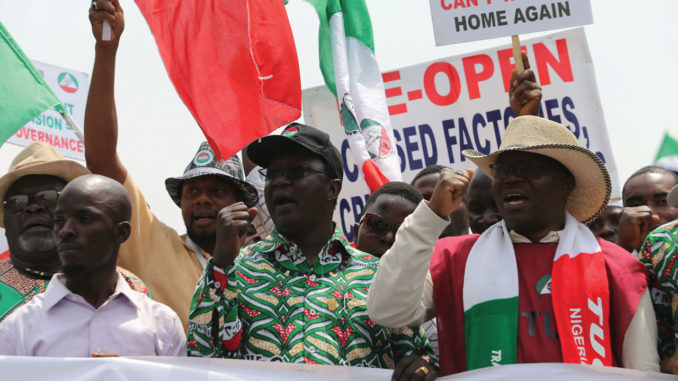
Labour unions have submitted their preferred percentage on the ‘consequential increase’ in workers’ salaries arising from the new minimum wage of N30,000.
Leaders of the unions held a meeting with the Minister of Labour and Employment, Chris Ngige, in Abuja on Monday.
The meeting is a preparatory one to the Tuesday meeting after which labour will take a decision on whether to proceed on an indefinite strike or not.
PREMIUM TIMES reported how the unions asked their branches across the country to get set for an industrial action.
The labour unions had earlier issued a communiqué, warning that economic activities would be shut on October 16.
They said they would go on strike if the federal government failed to reconvene a meeting of the committee on consequential adjustments of workers salaries based on the new minimum wage.
The unions, led by the Nigeria Labour Congress (NLC), also insisted that the government should hold a final meeting on October 15 to resolve the disagreements.
Grouse
The major issue delaying the full implementation of the minimum wage is the percentage salary increase for certain categories of workers.
Labour is demanding 29 per cent salary increase for officers on salary level 07 to 14 and 24 per cent adjustment for officers on salary grade level 15 to 17.
But the federal government had presented a proposal of 11 per cent salary increase for officers on grade level 07 to14 and 6.5 per cent adjustment for workers of grade level 15 to 17.
There is no disagreement over the minimum wage to federal workers on grades 1-6 as that is already being implemented.
‘Tug of war’
The federal government and the unions have met on different occasions to resolve the minimum wage controversy.
The meetings notwithstanding, labour unions are preparing for a strike action if their demands are not met.
Meanwhile, Mr Ngige, before the Monday meeting began, said it was important to soften the ground before the major meeting on Tuesday.
He said part of his job as a minister in the ministry was to ensure industrial peace.
“If we don’t soften the ground bullets will fly and at the end of the day, we will come back to the negotiating table,” he said. “That is why we are doing this as a pro-active measure. Part of my work is to ensure that there is a quiet industrial milieu, workforce brings out
their full productivity and employers, businesses will not be disrupted.”
According to him, “We are going to do the mix grill meeting (on Tuesday). That mix grill meeting tomorrow can be one hour meeting, it can be two hours, or it can be twelve hours, depending on what we are able to achieve today. I appeal to everybody to show some understanding.”
Labour responds
However, the deputy president of the NLC, Amechi Asugwuni, said the labour unions will embark on strike if the outcome of the Tuesday meeting does not satisfy their demand.
He said mobilisation of members for the strike was still going on.
“The meeting was a consultative one. The meeting took into consideration the essential issues about the minimum wage that is still pending. With the consultation, we were able to share information with the Minister of Labour and Employment in order to ensure the success of tomorrow meeting, ” he said.
“We believe that the federal government will do the needful because ours is a straight forward proposal. We have made our proposal to the FG before now and government is to respond. We believe that by tomorrow, we will get the FG feedback and know the next thing to do, ” he said .
He said the consequential adjustment “is a matter of percentage which requires give and take principle.”
“We are talking about compensation, salary and legitimate compensation
for work done. Inasmuch as we believe in the consequential adjustment,
it has to be reasonable. Otherwise, people (workers) will feel neglected,” he added.
Minimum wage
President Buhari signed a new minimum wage bill into law in April 2019. But its implementation has been stalled over disagreements between the unions and government representatives.
PREMIUM TIMES reported how the implementation of the new wage has remained a problem, arising from the issue of relativity and consequential adjustments.
On May 14, the federal government inaugurated the relativity and consequential adjustment committee, which set up a technical subcommittee to work out a template for the adjustment of salaries of public service employees.
END

Be the first to comment